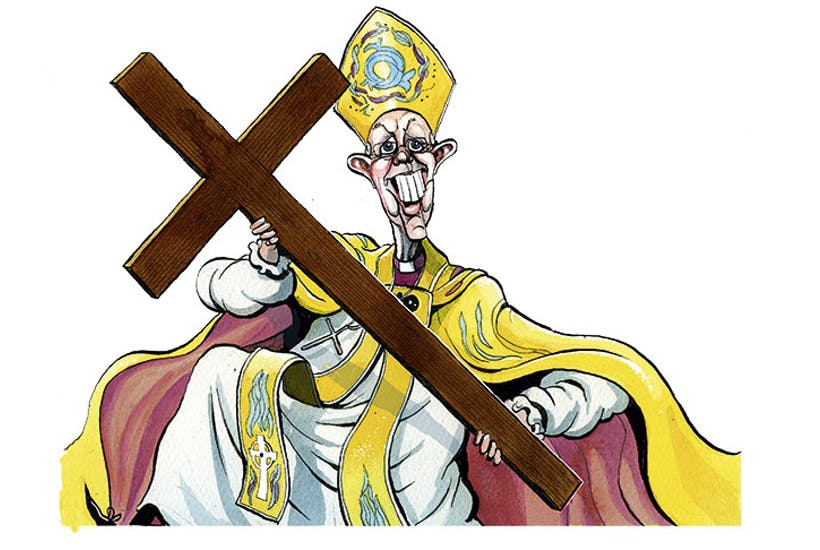What century is it? I ask because, this morning, the five most senior bishops in the country publicly rebuked our democratically elected government and effectively called on the unelected peers of the House of Lords to rebel against a Bill passed by the House of Commons. Bishops throwing their spiritual weight around to try to force political representatives to change course? I feel like I’ve just stepped out of a time machine into the 15th century.
In a letter published in the Financial Times today, the Archbishops of Canterbury, York, Wales and Armagh, as well as the Primus of the Scottish Episcopal Church, laid into the Internal Market Bill. As the Bill arrives in the Lords to be pored over by people none of us voted for — the madness of it! — these meddling men of the cloth have made their feelings known. The Bill will have terrible ‘moral, as well as political and legal, consequences’, they decree.
The Internal Market Bill is, of course, the piece of legislation that has caused nuclear-level meltdown in certain sections of the chattering classes. Its aim is to streamline the functioning of the UK’s internal market once the Brexit transition period comes to an end. Some say it is unfair to Scotland and Wales. But most of the swirling fury over the Bill has focused on its potential to override sections of the Brexit Withdrawal Agreement that pertain to Northern Ireland. And as we have been told ceaselessly, the Withdrawal Agreement is a legally binding international treaty. So if the government overrides any part of it, it will be breaking international law, and so on.
God’s representatives take up this theme in their letter in the FT. In pushing forward this Bill, the government is asking ‘the country’s highest law-making body to equip a government minister to break international law’, they say. Apparently, this would set a ‘disastrous precedent’. If ‘carefully negotiated’ treaties are not respected, the bishops ponder, then ‘on what foundations does our democracy stand?’
And then there’s the most ominous part of the letter. The bishops implicitly implore their fellow peers in the Lords to do something about this pesky, dastardly Bill. ‘We wish to highlight the grave responsibility of peers… as they debate the UK Internal Market Bill’, they write. Let’s make no bones about this: here we have five unelected men giving a nod and a wink to 800 unelected peers to push back against a Bill drawn up by a government voted into power by 13.9m people.
This is an unacceptable interference in the democratic process. The bishops are exploiting their religious authority to political ends. They are using the muscle of the Church to try to upset the progress of a Bill that was drawn up democratically, freely and fairly by politicians who were chosen by the electorate to run the country.
Indeed, their letter opens with the words: ‘As the Anglican primates of the four nations of the United Kingdom and Ireland….’ In short, listen to us because we are important; more important, apparently, than the voters who put Boris Johnson into power. Would the FT publish a letter by five plumbers outlining what should happen next in the Brexit process? Or from five painters and decorators? Five bus drivers, perhaps? After all, in a democracy their views should carry the exact same weight as Justin Welby’s.
That’s the beauty of democracy: on election day, the minimum-wage lady who cleans Lambeth Palace has the same power as the Palace’s holy inhabitant to determine the fate of the country. (The bishops in the Lords are the only peers who are allowed to vote in general elections.) When bishops seek to act as a block on the democratic process, they implicitly undermine the political equality that is a central part of democracy. They suggest in their letter that ‘carefully negotiated’ treaties and terms form the foundation of our democracy. But they don’t. We, the people, are the foundation of democracy. Our votes should be the highest form of political authority.
This affair once again raises the question of why bishops sit in the Lords. Although my preferred question is why does anyone sit in the Lords? It is 250 years since the great radical democrat Thomas Paine described the Lords as ‘the remains of aristocratical tyranny’, and yet we still have to put up with the perversion of an unelected second chamber keeping a watchful eye on the commoners voted for by the people. What right does a bishop (or anyone) have to stymie the process of a Bill drafted by the representatives of the masses?
It’s time we started to take democracy seriously. The events of the past few years have made it clear that the British people do not want to live in a technocracy in which Brussels bureaucrats meddle in our political affairs. I would wager that the vast majority of them also wouldn’t want to live in a theocracy in which bishops presume they have the moral authority to boss about our elected lawmakers. To paraphrase Justin Trudeau: it’s the 21st century, so what the hell are bishops doing in the world of politics?







Comments